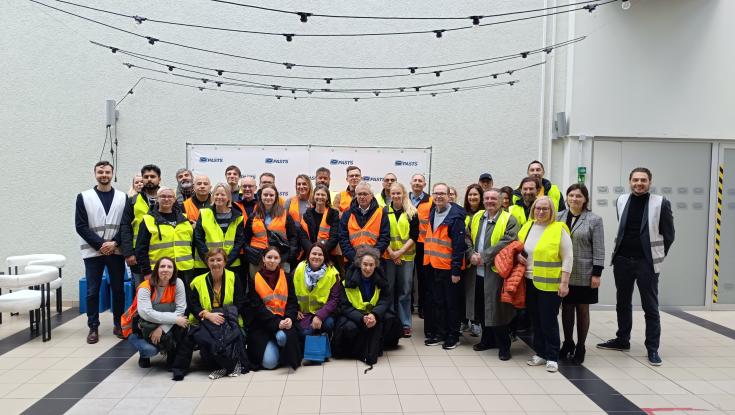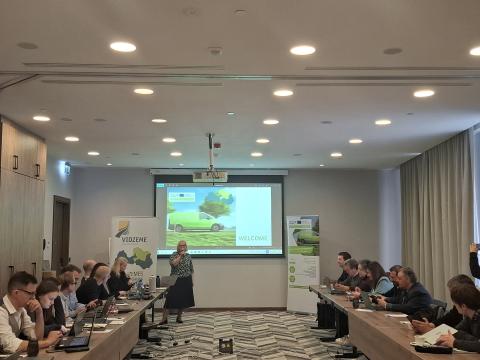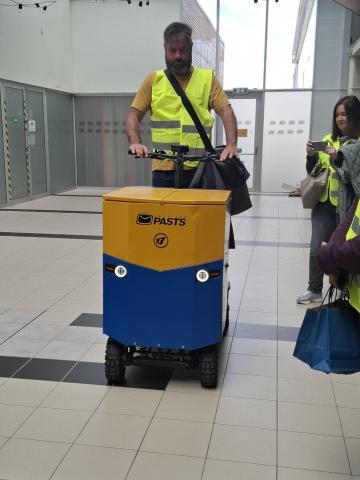Balancing Mobility, Freight, and Sustainability: EoE in Riga

The SPOTLOG 7th Main Interregional Exchange of Experience Event was held in Rīga, Latvia, 7-9 May, organised by the Vidzeme Planning Region.
Over three days, policy makers, urban planners, researchers, and logistics experts, 34 in-person participants, 3 online participants, from across Europe exchanged experience and explored innovative strategies that support greener, more efficient freight transport and mobility system, especially in low-density and rural areas.

The event featured a full-day conference on 7 May with engaging presentations and discussions on sustainable urban logistics, mobility governance, infrastructure planning, and data-driven solutions from partner. Special focus was given to carbon neutrality, regional policy improvements, and the integration of mobility and freight systems in a socially and economically sustainable way.
After a warm welcome from Vidzeme Planning region, Rudolfs Cimdins, Head of Spatial Planning unit, Rīga Planning region, told how the Riga Metropolitan Area is shaping a Greener Future through Mobility Governance, in an evolution process from voluntary cooperation to regulated approaches.
Expert from Leading partner, Aveiro University, Jorge Bandeira, focused on potential measures needed to improve regional policies, showing a clear correlation between the SPOTLOG Good Practices gathered so far and regional readiness for sustainable last-mile delivery. Eloísa Macedo, Aveiro University, shared the results of SPOTLOG Survey: as part of the project, a stakeholder survey was conducted to gather valuable insights on current and future challenges related to last-mile delivery planning and management policies across the SPOTLOG regions. The study aimed to understand stakeholder perspectives on key challenges and opportunities in last-mile delivery, helping to improve logistics policies, enhance urban mobility, and foster more sustainable delivery solutions across the regions.
Key Presentations and Insights:
Comune di Rimini (Italy) – Melania Braghin presented the city’s Sustainable Urban Logistics Plan (SULP), which was developed through a participatory approach involving logistics operators. The plan addresses issues like increased freight demand, deliveries by vans, illegal parking, and limited traffic zones (LTZs).
Flanders (Belgium) – Bart Dumoulin from The New Drive emphasized the need for a legal and clear framework for zero-emission urban distribution. He also highlighted the importance of pilot projects, collaborative approaches, and stakeholder consultations to promote sustainable city logistics.
Mobilise VUB (Belgium) – Claire Schelfhout discussed the logistics impact of urbanization and proposed integrating logistics hubs into new developments to meet growing delivery demands more sustainably.
Tampere (Finland) – Timo Rainio, Sami Kalliokoski, and Petri Pohjola from TAMK showcased how Tampere uses IoT and open data to create a dynamic overview of city operations. Their platform helps automate services, guide maintenance, and improve decision-making and citizen experiences.
Lille (France) – Julien Bouvet shared insights into the city's green logistics partnerships with the port and food market, and introduced the Lille Low Carbon Pact, a collaborative agreement to drive sustainability in construction logistics.
Ialoveni (Moldova) – Tudor Mancas reported on the city's mobility enhancements, including a new Sustainable Urban Mobility Plan (SUMP), institutional capacity-building, and efforts to modernize public transport with support from EU projects.
Rome (Italy) – Elisa Lombardi described the Move 21 project, an EU-funded initiative that has implemented cycle-logistics solutions in Rome to create flexible, low-emission delivery systems with positive social and environmental outcomes.
Fundão (Portugal) – Michaela Gil introduced the city’s upcoming Smart Micro Logistics Hub, a pilot inspired by Mechelen’s experience, highlighting the value of cross-border knowledge exchange.
Key themes, represented from project partners included:
- Sustainable Last-Mile Delivery: Addressing challenges in rural and urban settings, with a focus on scalable solutions adaptable to various contexts.
- Innovative Logistics Models: Exploring crowd logistics, food lockers, and smart micro logistics hubs to enhance delivery efficiency and reduce carbon footprints.
- Data-Driven Mobility Planning: Utilising mobility data collection and analysis to inform sustainable urban logistics strategies.
- Policy Development: Formulating recommendations for zero-emission logistics and integrating facilities planning for carbon reduction.

Study visits on 8 May, included tours of innovative logistics and mobility solutions in Riga: Latvian Post company, cargo scooter startup Bruntor, Āgenskalns Market and izipizi.lv food locker.
The final day was dedicated to sustainable mobility policy in Riga and internal partner meetings.
